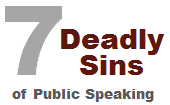“And that’s the way it is.”
Former CBS News anchor Walter Cronkite closed every nightly broadcast with that signature phrase, a signal to his viewers of not simply the conclusion of his broadcast but the authenticity of what they had just experienced.
The familiar phrase, repeated every weeknight, threw a security blanket around his viewers. His mantra — decisive on principle and incisive on purpose — made his audience feel special, that they had been part of something tailored specifically for them.
You, too, can wrap your audience in a security blanket with a signature closing phrase at any type of recurring meetings. Read on to discover examples of mantra-like closing phrases that may stimulate your creativity in fashioning your own signature close.
Continue Reading »




































